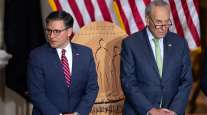Senior Reporter
Funding Bills to Dominate Congress’ Fall Legislative Agenda

[Stay on top of transportation news: Get TTNews in your inbox.]
When congressional funding leaders return to Washington on Oct. 15, they plan to cut through a tense political atmosphere and resume negotiations on their fiscal 2020 appropriations measures.
A transportation bill that would provide funding for the U.S. Department of Transportation, its agencies and programs designed to advance infrastructure projects, will be among the items on the agenda.
The House and Senate have yet to reconcile the differences in their versions of the transportation bills. The federal government’s funding authority expires Nov. 21.
Both transportation bills would provide $1 billion for infrastructure grants and similar funding levels for the Federal Motor Carrier Safety Administration. In the Senate bill, FMCSA would receive $679 million. In the House version, the agency would receive $677 million.
I believe we must find a way to work together to produce the outcome the American people expect of us — what they deserve from us, which is to fund the government in a deliberate and bipartisan manner.
Senate Appropriations Chairman Richard Shelby (R-Ala.)
Related to trucking matters, the Senate bill would prohibit funding for the enforcement of the electronic logging device mandate for livestock haulers. Also, in a report that accompanied the bill, senators encouraged the Federal Highway Administration to finish a study on the impact that automated vehicles have on highway infrastructure. Also in the report, senators acknowledged a shortage of commercial drivers. They then encouraged FMCSA to examine ways to expand the commercial driving workforce.
The House bill would require FMCSA to proceed with annual inspections of rear underride guards. It also would require the agency to publicly post certain Compliance, Safety, Accountability program information online, and it would deny funding for FMCSA’s review of an industry concern regarding state meal-and-rest-break laws.
Before leaving Washington for the fall recess, Senate Appropriations Chairman Richard Shelby (R-Ala.) reminded colleagues of the need to ensure the federal government is funded through the remainder of the fiscal year.
“I believe we must find a way to work together to produce the outcome the American people expect of us — what they deserve from us, which is to fund the government in a deliberate and bipartisan manner. I encourage my colleagues on both sides to set aside partisan politics so we can get the job done sooner rather than later,” Shelby said Sept. 26.

Lowey
His counterpart in the House, Rep. Nita Lowey (D-N.Y.), also pledged to resume bicameral negotiations. As she put it, “Democrats will negotiate responsible spending bills that uphold our values and give working families a better chance at a better life.”
Last month, Trump signed a continuing resolution to fund the government through Nov. 21. It averted a shutdown of federal agencies when the fiscal year began.
While congressional leaders try to reach a compromise on fiscal 2020 funding levels and nonfunding provisions, tensions between members of Speaker Nancy Pelosi’s team and the Trump White House continue to escalate. House Democrats are proceeding with an impeachment inquiry of the president.
Despite the high-profile inquiry, several policymakers have expressed hope for Congress’ ability to advance an infrastructure measure. Trump and the leadership in the House and Senate had negotiated infrastructure policy earlier this year. Over the summer, a Senate panel advanced a five-year highway reauthorization bill.
“We’re going to continue to do the business of the American people, as we have been doing from the moment that we regained the majority,” Rep. Hakeem Jeffries (D-N.Y.) said during an Oct. 6 press event. “We’ve promised that we’re going to work to fix our crumbling infrastructure. We want to invest at least $1 trillion [and] create 16 million good-paying jobs.”
“I hope we can beat the trend of history,” Rep. Rodney Davis (R-Ill.), ranking member of the Highways and Transit Subcommittee, told The Hill newspaper Sept. 26. “I hope it doesn’t get sidetracked, but history shows us that impeachment will suck the energy and the air out of everything out here in Washington.”
Want more news? Listen to today's daily briefing:




